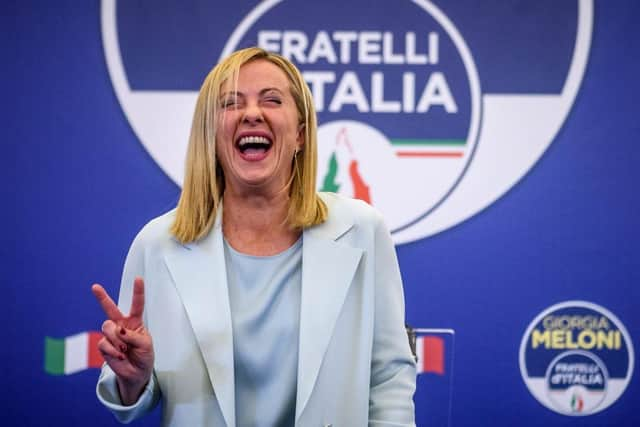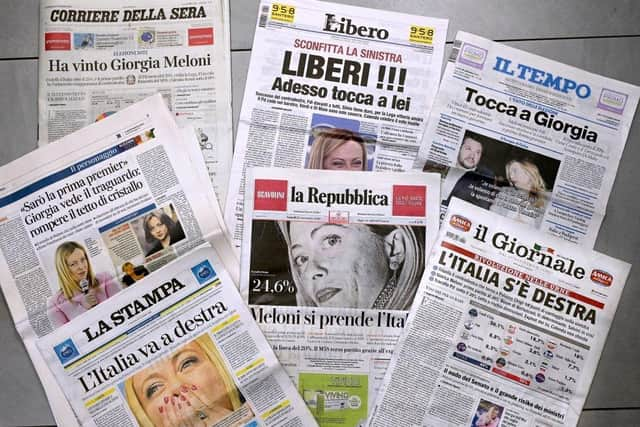Italy’s coalition government attempts to present united front as Giorgia Meloni makes history as likely first female prime minister
Now Giorgia Meloni is set to be named prime minister on a far right ticket as leader of a party with echoes of fascist leader Benito Mussolini.
"Italy goes to the right”, shouted the front page of Turin-based daily newspaper La Stampa on Monday morning after the weekend vote.
Advertisement
Hide AdAdvertisement
Hide AdFratelli d’Italia (Brothers of Italy) was set to win 26 per cent of the vote in the general election, a snap vote called after the collapse of the national unity government led by Mario Draghi in July. The figure is a huge leap from Ms Meloni’s previous support of four per cent of the electorate, revealing a large swing to the right in a country which has been troubled with economic woes, a cost of living crisis and an ongoing divide over immigration.


While the appointment of prime minister is to be decided by the president and will be unlikely to be finalised before October, Ms Meloni’s party’s win – running on a traditionalist platform of "God, fatherland and family", also the motto of far-right Brazilian leader Jair Bolsonaro - puts her in prime position for the role.
Italy is a country of huge historic political instability. It has had 69 governments since World War Two, which works out at just under one a year.
European leaders have tentatively welcomed Ms Meloni, with the German government saying it expects Italy to continue to be a "very Europe-friendly country. However, although she has tempered previously anti-European rhetoric in recent times and is likely to be tied to the bloc by the need for economic support, it is believed Ms Meloni could cause problems for EU leaders if she teams up, politically speaking, on certain issues with Hungarian prime minister Viktor Orban and Polish leader Mateusz Morawiecki.
Giuseppe Fama, head of EU affairs at NGO Crisis Group, warned that Ms Meloni could “build a larger ultra-conservative group with Orban” within the EU.


On claiming her victory, Ms Meloni insisted she would "govern for everyone".
"Italians have sent a clear message in favour of a right-wing government led by Brothers of Italy," she said. "We will do it with the aim of uniting people, of enhancing what unites them rather than what divides them."
Arguably, one of Ms Meloni’s greatest attractions is that she has not yet been in a position to alienate voters.
Advertisement
Hide AdAdvertisement
Hide AdUnlike the other parties vying for power in the election, Brothers of Italy was not part of the last national unity government and was therefore not involved in the furore which led to the snap election. Earlier this year, Five Star Movement, League and Forza Italia all withdrew their support for the government over a €27 billion aid package to counteract the energy and economy crisis, resulting in Mr Draghi’s resignation.
Ms Meloni sent shockwaves through Italy’s liberal left when, earlier this year, she addressed a rally of Spanish far-right party Vox, laying out her stance on LGBT issues.
“Yes to the natural family, no to the LGBT lobby, yes to sexual identity, no to gender ideology, yes to the culture of life, no to that of death,” she told the crowds. She is also understood to be opposed to abortion and euthanasia.
Since then, she appears to have attempted to moderate her platform. She has indicated that she is pro-Ukraine, unlike Matteo Salvini, leader of the far-right League and Silvio Berlusconi and his party Forza Italia – both of whom are to form an alliance with Brothers of Italy to allow the right to take control of both Italian houses of parliament. Yet the alliance is already showing cracks behind the scene. A year ago, a secret recording witnessed Mr Salvini describing Ms Meloni as a “pain in the ass” after her party won votes away from his own in local elections in the north of Italy.
Mr Berlusconi just last week sparked a row after defending the Russian president, Vladimir Putin, over the war in Ukraine. The former prime minister insisted that Russians had “pushed Mr Putin, an old fiend of his, into the war, along with ministers who had wanted to see Voloymyr Zelensky’s government replaced.
Ms Meloni, on the other hand, has insisted that she supports Ukraine and has pledged both to continue sanctions against Russia and to supply weapons to Ukraine.
Ahead of the election, Italian journalist David Caretta was sceptical that that would continue.
"In fact, Meloni can change her stance on everything at the speed of light,” he said. “She did it on the eurozone, on the EU, on fiscal responsibility, on fascism and on Mussolini. She could do it again with Russia.”
Advertisement
Hide AdAdvertisement
Hide AdThe tensions between Ms Meloni and her two male counterparts will not have improved any by this weekend’s election results, which saw both League and Forza Italia lose votes, while Brothers of Italy cleaned up.
However, another female politician in Mr Berlusconi’s party has already stepped in in an attempt to unite the coalition, insisting that Ms Meloni’s politics are not as extreme as they seem.
"My feeling is that in some cases abroad there is a wrong perception of what Brothers of Italy is," said Forza Italia MP Deborah Bergamini.
"It is not a far-right party, it’s a democratic right party with a long history around Giorgia Meloni, who has already been a minister in a Berlusconi government and has experience in ruling the country - so very different from the perception that is shared abroad."
Meanwhile, whatever Ms Meloni’s personal aims are in terms of uniting her country, she has a few loose canons within her own party who could be harder to control.
The party has hit the headlines for its attempts to outlaw cartoon Peppa Pig for an episode featuring a family with gay parents. Frederico Mollicone, culture spokesman for Brothers of Italy, in September urged Italian state broadcaster RAI not to air an episode of Peppa Pig that features a polar bear named Penny with two mothers, calling it “gender indoctrination”.
“The decision of the authors of the cartoon to include a character with two mothers is unacceptable," Mr Mollicone said. “Political correctness strikes once again, and it’s our children who pay for it.”
His comments were taken up by Isabella Rauti, senator and Brothers of Italy spokesperson for equal rights, who said she hoped that the national broadcaster didn’t “act as a megaphone for controversial ideologies”.
Advertisement
Hide AdAdvertisement
Hide AdIn another PR highlight, Mussolini’s own granddaughter, Rachele Mussolini, is a councillor for Ms Meloni’s party. Three years ago, Ms Mussolini, named after her grandmother and Mr Mussolini’s wife, Rachele, charged $5,000 a head for promoting a history tour called "Duce! The Rise and Fall of Italian Fascism" in her hometown, Predappio.
Comments
Want to join the conversation? Please or to comment on this article.
